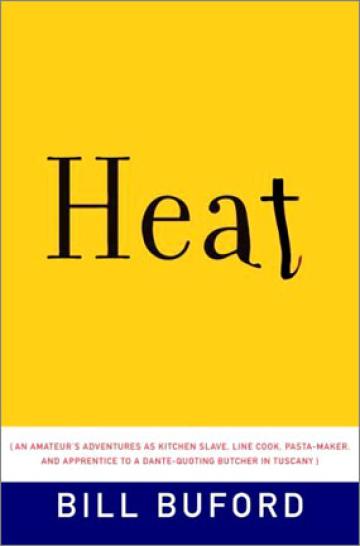Bill Buford's HEAT
Bill Buford is not afraid to get his feet wet. For his first book, Among the Thugs, the Granta founder and former New Yorker fiction editor immersed himself in the world of British soccer hooligans. Heat chronicles the 15 months Buford spent intermittently laboring in a three-star kitchen and escaping to the Italian countryside in search of a true understanding of food: where it comes from, what it evokes, and what it means to make it the right way.
Mario Batali, the ubiquitous chef with a personality that outsizes his considerable girth, is at the heart of Heat even when not on the page. It is Batali who lets Buford work at Babbo as a "journalist-tourist" and "kitchen bitch." It is also Batali who sends Buford abroad to learn from the old Italian masters. Buford's ability to capture the "myth of Mario" in print - as well as the other extreme characters he meets - is one of the book's pleasures. These famous "food lunatics," masticating their way through a menu that would kill mere mortals, "could all have been walk-on parts in a medieval play about the deadly sins (all seven)."
While Anthony Bourdain's Kitchen Confidential already blew the swinging doors off the professional kitchen, Buford's behind-the-scene adventures are still revealing. Buford is not there as a professional. He works his way up the hierarchy, swallowing the evidence when he fails to chop correctly, falling deliriously behind at the grill station, and knocking a shelf of prepared plates into the pasta pot. To his naá¯f eyes, the understanding of a new technique or the role of certain ingredients constitutes a "revelation." His enthusiasm as he suffers his many indignities is contagious, until he finally achieves a "quiet buzz" while completing a plate that "looked exactly and aesthetically correct." Buford also vividly portrays the pressure and politics of the kitchen, the collision of talent and ego. And his eye for detail is always sharp: a pot of boiling chicken feet is metamorphosized into souls trying to escape a bubbling portal from hell, and his body, still radiating heat at 4:00 am after a grueling night at the pasta station, is transformed into a sausage.
Once in Italy, Buford is struck by an invisible culinary history. People have passed down the same family secrets in the same words for 500 years, and food creates an intimate connection to the past. He discovers that "you can't do traditional work at a modern pace. Traditional work has traditional rhythms."
The structure of the book doesn't always allow for narrative momentum. It jumps around, mixing in Batali's back story and events at Babbo. Tangents, like the search for when egg was first used in pasta or a long riff on polenta, don't always lead anywhere. An important connection is also missed: What is the ultimate relationship between the spiritual connection to food and through it family heritage that he finds in Italy, and the $29 plate of pasta served to a New Yorker with an expense account?
Still, these are small gripes, like the need for another pinch of salt. In a world of celebrity chef as brand, Heat demonstrates just how wide the gap is between the professionals and those of us imitating at home. But it also raises a glass to anyone cooking with love.
